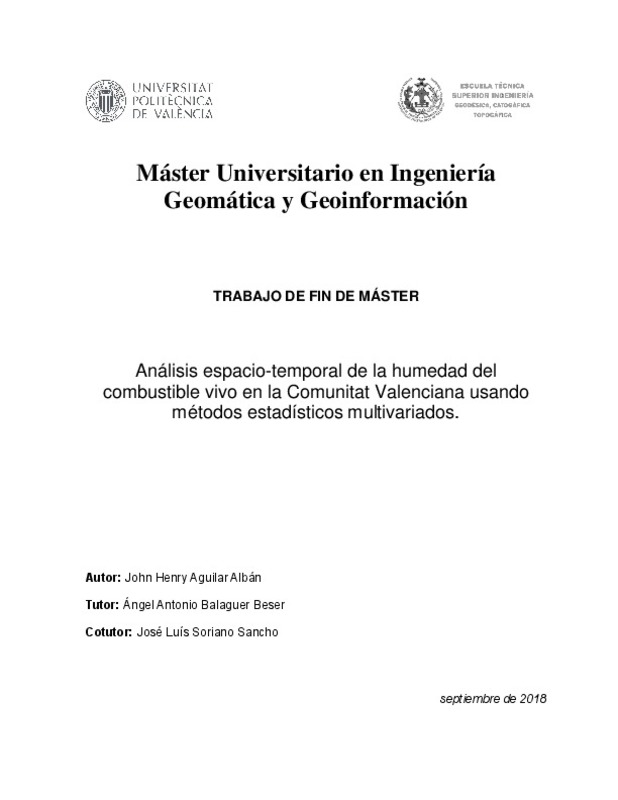JavaScript is disabled for your browser. Some features of this site may not work without it.
Buscar en RiuNet
Listar
Mi cuenta
Estadísticas
Ayuda RiuNet
Admin. UPV
Análisis espacio-temporal de la humedad del combustible vivo en la Comunidad Valenciana usando métodos estadísticos multivariados
Mostrar el registro sencillo del ítem
Ficheros en el ítem
| dc.contributor.advisor | Balaguer Beser, Ángel Antonio
|
es_ES |
| dc.contributor.advisor | Soriano Sancho, José Luis
|
es_ES |
| dc.contributor.author | Aguilar Albán, John Henry
|
es_ES |
| dc.date.accessioned | 2021-03-30T15:30:54Z | |
| dc.date.available | 2021-03-30T15:30:54Z | |
| dc.date.created | 2018-09-14 | |
| dc.date.issued | 2021-03-30 | es_ES |
| dc.identifier.uri | http://hdl.handle.net/10251/164694 | |
| dc.description.abstract | [ES] Para que se inicie un fuego es necesario que se produzca una reacción de combustión en la que interviene un combustible, un comburente y una aportación de calor. La disponibilidad de los combustibles y el comportamiento del fuego son claves en la gestión integral de los incendios forestales, y estos dos factores están condicionados por la humedad del combustible vivo, el cual indica el contenido de agua que tiene la vegetación. De esta forma, es necesario efectuar un análisis espacio-temporal de la humedad del combustible vivo para comprender y predecir el comportamiento del fuego en un incendio forestal. En este trabajo se plantea efectuar un estudio de la humedad del combustible vivo de la especie vegetal Rosmarinus officinalis, la cual está presente en la mayoría de los montes de la Comunidad Valenciana (España). Para ello se usarán los datos que mensualmente viene adquiriendo la empresa pública VAERSA para la Dirección de Prevención de Incendios Forestales de la Generalitat Valenciana, desde abril de 2014 hasta diciembre de 2017, en 18 puntos de muestreo repartidos por las tres provincias de la Comunidad Valenciana. Se usará el software libre R para efectuar un análisis espacial y temporal de la distribución de estos datos, analizando su relación con otras variables meteorológicas y topográficas. Se investigará la aplicación de técnicas de análisis multivariante (correlación, regresión múltiple ) y técnicas geoestadísticas para confeccionar mapas que reflejen la distribución espacial de la humedad de combustible vivo en la Comunidad Valenciana bajo distintas condiciones ambientales. | es_ES |
| dc.description.abstract | [EN] It is necessary to produce a combustion reaction involving a fuel, an oxidizer and a contribution of heat for a fire to start. The availability of fuels and fire behavior are the key to the integral management of forest fires, and these two factors are conditioned by the live fuel moisture content, which indicates the water content of the vegetation. In this way, it is necessary to carry out a spatio-temporal analysis of the live fuel moisture content to understand and predict the behavior of fire in a forest fire. In this work, it is proposed to carry out a study of the humidity of the live fuel of the Rosmarinus officinalis vegetable species, which is present in most of the forests of the Valencian region (Spain). To this end, the data that the public company VAERSA has been acquiring every month for the Dirección de Prevención de Incendios Forestales of the Generalitat Valenciana, from April 2014 to December 2017, in 18 sampling points distributed throughout the three provinces of the Valencian region, will be used. Free R software will be used to perform a spatial and temporal analysis of the distribution of this data, analyzing its relationship with other meteorological and topographic variables. The application of multivariate analysis techniques (correlation, multiple regression ...) and geostatistical techniques to prepare maps that reflect the spatial distribution of live fuel moisture content in the Valencian region under different environmental conditions will be investigated. | es_ES |
| dc.format.extent | 173 | es_ES |
| dc.language | Español | es_ES |
| dc.publisher | Universitat Politècnica de València | es_ES |
| dc.rights | Reconocimiento - No comercial - Compartir igual (by-nc-sa) | es_ES |
| dc.subject | Regresión múltiple | es_ES |
| dc.subject | Monte mediterráneo | es_ES |
| dc.subject | Incendios forestales | es_ES |
| dc.subject | Humedad del combustible vivo | es_ES |
| dc.subject | Métodos estadísticos multivariados | es_ES |
| dc.subject | Krigeado | es_ES |
| dc.subject | Rosmarinus officinalis | es_ES |
| dc.subject | Mediterranean forest | es_ES |
| dc.subject | Live fuel moisture content | es_ES |
| dc.subject | Multivariate statistical methods | es_ES |
| dc.subject | Kriging | es_ES |
| dc.subject | Multiple regression | es_ES |
| dc.subject | Forest fires | es_ES |
| dc.subject.classification | MATEMATICA APLICADA | es_ES |
| dc.subject.other | Máster Universitario en Ingeniería Geomática y Geoinformación-Màster Universitari en Enginyeria Geomàtica i Geoinformació | es_ES |
| dc.title | Análisis espacio-temporal de la humedad del combustible vivo en la Comunidad Valenciana usando métodos estadísticos multivariados | es_ES |
| dc.type | Tesis de máster | es_ES |
| dc.rights.accessRights | Abierto | es_ES |
| dc.contributor.affiliation | Universitat Politècnica de València. Departamento de Matemática Aplicada - Departament de Matemàtica Aplicada | es_ES |
| dc.contributor.affiliation | Universitat Politècnica de València. Escuela Técnica Superior de Ingeniería Geodésica, Cartográfica y Topográfica - Escola Tècnica Superior d'Enginyeria Geodèsica, Cartogràfica i Topogràfica | es_ES |
| dc.description.bibliographicCitation | Aguilar Albán, JH. (2018). Análisis espacio-temporal de la humedad del combustible vivo en la Comunidad Valenciana usando métodos estadísticos multivariados. Universitat Politècnica de València. http://hdl.handle.net/10251/164694 | es_ES |
| dc.description.accrualMethod | TFGM | es_ES |
| dc.relation.pasarela | TFGM\83858 | es_ES |
Este ítem aparece en la(s) siguiente(s) colección(ones)
-
ETSIGCT - Trabajos académicos [494]
Escuela Técnica Superior de Ingeniería Geodésica, Cartográfica y Topográfica






